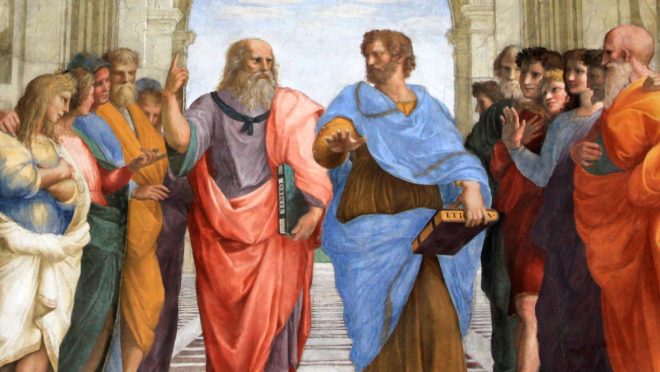
A stimulating practice is the quest to discover what the world was like in antiquity and how humans and society have evolved in the last 3000 years. At the time of the existence of our planet, 3 thousand years was a short period, but long enough for man to evolve from the animal life of elementary rationality to what we are today, with physical, mental, economic, political and social complexity.
If we consider that only 200 years ago there were no anesthesia, antibiotics, electricity, radio, telephone, car, plane, television, computer, Internet … and that the first passenger train appeared only in 1825, the difference between what is human life today And what it was 2000 or 3000 years ago is a giant that man did not imagine until recently.
There are two suggestive questions: 1. How did humanity understand and explain natural events and phenomena 3000 years ago? two. How and when did the scientific method for knowing and explaining these same phenomena occurred? Somewhat simplified and without a specific date, up to 2,600 years ago, the events of the world – such as day and night, sun and rain, light and darkness, cold and heat, wind, lightning, storms, etc. – Explained through legends.
The difference between the form of human life today and what it was like 2000 or 3000 years ago is a huge difference that man did not imagine until recently.
Mythology is a narrative that explains events, facts, or phenomena by attributing their occurrence to supernatural causes and, therefore, impossible to prove. Mythology was the practice of attributing to the unknown and invisible deities or entities everything that exists in the world and takes place in it. The myth has no basis or justification. Therefore, it is not subject to criticism or questioning: it is just faith.
It was around 600 BC when the Greeks introduced scientific philosophical thinking. Greece is the cradle of science, that is, the attempt to understand nature, life and its events by knowing the things that are observed or felt. Science presupposes the abandonment of mythological explanations based on supernatural entities created by human imagination.
The movement to know nature through the observation and study of nature itself began in the sixth century BC by the philosopher Thales of Miletus. However, the methodology of scientific-philosophical inquiry developed strongly with Plato (428-348 BC), who devoted himself to organizing the problem of knowledge through four questions: Possibility Knowledge: Is it possible to know the world and its truth? Over the method: What are the steps and procedures that lead to securing knowledge? about the Tools Knowledge: the use of the senses and the mind. and about the Goal Knowledge: the external world, its structures and action.
Therefore, it is fair to say that as a scheme for the study of nature through experiments and tests to find out its logic and natural phenomena, science is a Greek invention. Aristotle (384 – 322 BC), following his teacher Plato, promoted amazing advances in the practice of observing, examining, and knowing nature and its phenomena and manifestations.
Giordano Bruno (1548-1600) is credited with the phrase “If you want to know nature, consult nature, not the gods.” If Bruno said this, he would repeat Aristotle when he said that the key to understanding natural reality must exist in reality itself, not outside it. Aristotle occupies a very special place on the stage of the great geniuses of mankind in the organization of rational logical discourse and the formation of the theory of dialectics.
An argument is a conclusion, positive or negative, that is derived from premises. If the conclusion bears a logical and definite relationship with the premises, then the conclusion is true, and it is a valid argument, although this does not mean that it is true. The criterion of “correctness” is simply the relation of reasoning between the premises and the conclusion. However, while the argument is logical, it may be wrong.
If we are to improve the intellectual and cultural level of our grandchildren, education in the family and school must not abandon real philosophy and science to make room for inventions that do not replace the classical education that made humanity progress.
It doesn’t hurt to repeat the first lesson of starting to think about logic. If you say “All people are human. Peter is a man. So Peter is mortal.” There is a logical relationship between the conclusion and the premise, so the conclusion is also true and true because the premises are true. But if you say “All snakes fly; anaconda is a snake. Therefore, anaconda fly ”, then the conclusion is correct, because it is logically connected with buildings. But it is a wrong conclusion, because the first assumption is wrong: snakes do not fly.
I attended the course last year philosophy of lawby Professor Dalton Oliveira (there are 20 15-minute chapters available on YouTube for free), I connected his chapters to the teachings of philosophy coming from Greece 400 years before Christ and contemplated the beauty of scientific thinking that began there and arrives in our days sealed with the achievements of various sciences.
At the same time, I thought also of the suffering of intellectuals (such as Professor Dalton) and the cultural backwardness resulting from the lack of reason and the poverty of arguments thrown in our faces every day by various political and institutional bodies, with the voice of their representatives. If we are to improve the intellectual and cultural level of our grandchildren, education in the family and school must not abandon real philosophy and science to make room for inventions that do not replace the classical education that made humanity progress.

“Wannabe internet buff. Future teen idol. Hardcore zombie guru. Gamer. Avid creator. Entrepreneur. Bacon ninja.”

